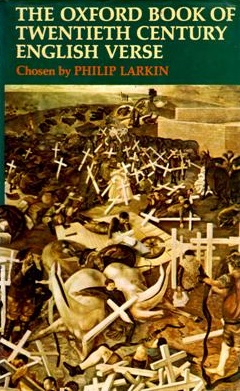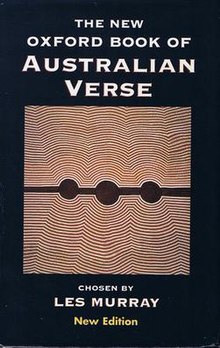
The Oxford Book of Twentieth Century English Verse is a poetry anthology edited by Philip Larkin. It was published in 1973 by Oxford University Press with ISBN 0-19-812137-7. Larkin writes in the short preface that the selection is wide rather than deep; and also notes that for the post-1914 period it is more a collection of poems, than of poets. The remit was limited by him to poets with a period of residence in the British Isles. Larkin's generous selection of Thomas Hardy's poems has been noted for its influence on Hardy's later reputation. On the other hand, he was criticized, notably by Donald Davie, for his inclusion of "pop" poets such as Brian Patten. The volume contains works by 207 poets.
The Penguin poetry anthologies, published by Penguin Books, have at times played the role of a "third force" in British poetry, less literary than those from Faber and Faber, and less academic than those from Oxford University Press..
The Oxford University Press published a long series of poetry anthologies, dealing in particular with British poetry but not restricted to it, after the success of the Oxford Book of English Verse (1900). The Oxford poetry anthologies are traditionally seen as 'establishment' in attitude, and routinely therefore are subjects of discussion and contention. They have been edited both by well-known poets and by distinguished academics. In the limited perspective of canon-formation, they have mostly been retrospective and well-researched, rather than breaking fresh ground.

Up The Line To Death: The War Poets 1914–1918 is a poetry anthology edited by Brian Gardner, and first published in 1964. It was a thematic collection of the poetry of World War I.
The Kenneth Slessor Prize for Poetry is awarded annually as part of the New South Wales Premier's Literary Awards for a book of collected poems or for a single poem of substantial length published in book form. It is named after Kenneth Slessor (1901–1971).
The Penguin Book of Modern Australian Poetry is a major anthology of twentieth century Australian poetry. Edited by poets Philip Mead and John Tranter it was published by Penguin Australia in 1991. Aside from the usual criticisms any such anthology will produce, it raised some eyebrows at the time for its inclusion of all the Ern Malley hoax poems. It might be claimed there is no accepted canon of contemporary Australian poetry and this book is the selection of its editors.
The Christopher Brennan Award is an Australian award given for lifetime achievement in poetry. The award, established in 1973, takes the form of a bronze plaque which is presented to a poet who produces work of "sustained quality and distinction". It was awarded by the Fellowship of Australian Writers and named after the poet Christopher Brennan. The most recent award was made in 2015.
The Paul R. Halmos – Lester R. Ford Award is a $1,000 prize given annually by the Mathematical Association of America for authors of articles of expository excellence published in The American Mathematical Monthly or Mathematics Magazine. It is awarded to at most four authors each year. The prize was established in 1964 as the Lester R. Ford Award to honor the contributions of mathematician and former MAA president Lester R. Ford. In 2012 the award was renamed the Paul R. Halmos – Lester R. Ford Award to honor the contributions of former The American Mathematical Monthly editor Paul R. Halmos and the support of the Halmos family for the awards. Halmos himself received the award in 1971 and 1977.
The Grace Leven Prize for Poetry was an annual poetry award in Australia, given in the name of Grace Leven who died in 1922. It was established by William Baylebridge who "made a provision for an annual poetry prize in memory of 'my benefactress Grace Leven' and for the publication of his own work". Grace was his mother's half-sister.
Niel Wright is a New Zealand poet, literary critic, bibliographer, publisher, and cultural and political commentator. His major piece of work is his epic poem The Alexandrians, self published in 120 books between 1961 and 2007 and totaling some 36,000 lines. He has since self published 1045 post-Alexandrian poems totaling 8331 lines, of which 681 are triolets. He has also published extensive notes to The Alexandrians.
This article presents a list of the historical events and publications of Australian literature during 1948.
This article presents a list of the historical events and publications of Australian literature during 1957.
This article presents a list of the historical events and publications of Australian literature during 1959.
The Wind at Your Door (1959) is a one-poem volume by Australian poet R. D. Fitzgerald. The poem was originally published in The Bulletin on 17 December 1958, and later in this 275 copy Talkarra Press limited edition, signed by the author. It won the Grace Leven Prize for Poetry in 1959.
This article presents a list of the historical events and publications of Australian literature during 1998.


